| Listing 1 - 10 of 42 | << page >> |
Sort by
|
Book
ISBN: 900467487X Year: 1998 Publisher: Amsterdam : Brill,
Abstract | Keywords | Export | Availability | Bookmark
 Loading...
Loading...Choose an application
- Reference Manager
- EndNote
- RefWorks (Direct export to RefWorks)
This study deals with an intriguing recent find from Pella, a lead tablet with a magical spell inscribed on it. The object itself is by no means uncommon in classical antiquity: it belongs to a well-known and widespread category of finds, documented in most regions of the ancient world and covering a very broad period, from the early 5th cent. BC to late antiquity. Besides being the first "curse tablet" discovered in Macedonia, the new text from Pella is very important because of its relatively early date, before the middle of the 4th century BC. It also presents the particular interest of being the first text from this region written in dialectical Greek. Furthermore, it is unusual among similar documents in that it describes at some length the intention and expectations of its author, and provides information on the situation from which it has arisen.

ISBN: 9780271017501 9780271041728 9780271017518 0271041722 0271017503 0271017511 Year: 1998 Publisher: University Park, Pa Pennsylvania State University Press
Abstract | Keywords | Export | Availability | Bookmark
 Loading...
Loading...Choose an application
- Reference Manager
- EndNote
- RefWorks (Direct export to RefWorks)
"Preserved in the Bavarian State Library in Munich is a manuscript that few scholars have noticed and that no one in modern times has treated with the seriousness it deserves. Forbidden Rites consists of an edition of this medieval Latin text with a full commentary, including detailed analysis of the text and its contents, discussion of the historical context, translation of representative sections of the text, and comparison with other necromantic texts of the late Middle Ages." "Like many medieval texts for the use of magicians, it is a miscellany rather than a systematic treatise. It is exceptional, however, in the scope and variety of its contents - prayers and conjurations, rituals of sympathetic magic, procedures involving astral magic, a catalogue of spirits, lengthy ceremonies for consecrating a book of magic, and other materials."--BOOK JACKET
Magic --- Demonology --- History. --- Bayerische Staatsbibliothek.
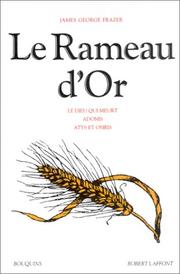

ISBN: 2221088476 9782221088470 Year: 1998 Publisher: Paris: Laffont,
Abstract | Keywords | Export | Availability | Bookmark
 Loading...
Loading...Choose an application
- Reference Manager
- EndNote
- RefWorks (Direct export to RefWorks)
Dieux qui meurent, dieux morts, rois divins mis à mort, réellement ou symboliquement, ces personnages apparaissent comme bien étranges. C'est à coup sûr un des grands mérites de Frazer que de les avoir désignés à notre attentin. L'idée du "dieu qui meurt", qu'il faut placer sans doute à mi-chemin du motif mythique et du concept, pose un problème que les historiens des religions et les ethnologues contemporains ont résolu, chacun pour eux pourrait-on dire, à l'intérieur de la culture et de la société qu'ils étudient, mais qui n'est pas élucidé complètement du point de vue mythologique. Le sentiment d'étrangeté du point de vue mythologique. Le sentiment d'étrangeté que suscite l'idée d'un dieu qui subit la mort, et la mort violente, s'atténue un peu lorsqu'on s'aperçoit que cette mort n'en est pas une : le dieu ressuscite, ou bien il vit pour toujours dans l'au-delà, ou bien encore au souverain mort succède immédiatement un autre souverain ("le roi est mort, vive le roi !"), équivalent puisqu'investi du même caractère sacré. Le mythe ne connaissant pas plus la contradiction que l'inconscient - dont il émane - n'hésite pas à représenter l'inverse de la mort par la mort et à élaborer des récits où la mort violente n'intervient peut-être que pour mieux être niée. Et Frazer, sans éclaircir complètement le sens du motif du "dieu qui meurt" en a eu cependant l'intuition poétique.Ces trois volumes nous entraînent dans les royaumes africains où l'on mettait à mort le souverain sacré lorsque ses forces commençaient à décliner, et dans les cultures de l'Antiquité méditerranéenne où l'on racontait les mythes et rejouait les rites de divinités masculines - Adonis, Tammouz, Atys, Osiris -, mourant de mort violente, puis revivant pour assurer le cycle toujours renouvelé de la fertilité végétale et de la fécondité animale et humaine.Nicole Belmont / Michel Izard
Religion --- Mythology --- Religion --- Magic --- Superstition
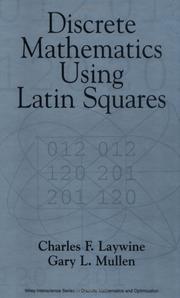
ISBN: 0471240648 9780471240648 Year: 1998 Publisher: New York (N.Y.) : Wiley,
Abstract | Keywords | Export | Availability | Bookmark
 Loading...
Loading...Choose an application
- Reference Manager
- EndNote
- RefWorks (Direct export to RefWorks)
Magic squares --- #TELE:SISTA --- Latin squares and rectangles --- Squares, Magic --- Number theory --- Mathematical recreations --- Magic squares.
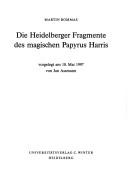
ISBN: 3825305856 9783825305857 Year: 1998 Volume: 1998/4 Publisher: Heidelberg : Carl Winter,
Abstract | Keywords | Export | Availability | Bookmark
 Loading...
Loading...Choose an application
- Reference Manager
- EndNote
- RefWorks (Direct export to RefWorks)
Magic, Egyptian --- Papyrus Harris no 1 --- Magic, Egyptian. --- Egyptian magic --- Coptic magic --- Papyrus Harris no. 1. --- Harris papyrus no. 1 --- Papyrologie --- Civilisation egyptienne --- Magie
Book
ISBN: 8886626363 Year: 1998 Publisher: Torino Ananké
Abstract | Keywords | Export | Availability | Bookmark
 Loading...
Loading...Choose an application
- Reference Manager
- EndNote
- RefWorks (Direct export to RefWorks)
Medicine, Egyptian --- Medicine, Magic, mystic, and spagiric
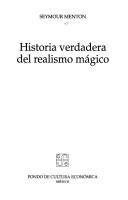
ISBN: 9681654110 Year: 1998 Publisher: México, D.F. Fondo de Cultura Económica
Abstract | Keywords | Export | Availability | Bookmark
 Loading...
Loading...Choose an application
- Reference Manager
- EndNote
- RefWorks (Direct export to RefWorks)
Fiction --- Thematology --- Spanish-American literature --- Magic realism (Literature) --- Magic in art.
Book
ISBN: 2868206956 9782868206954 Year: 1998 Publisher: Strasbourg : Presses universitaires de Strasbourg,
Abstract | Keywords | Export | Availability | Bookmark
 Loading...
Loading...Choose an application
- Reference Manager
- EndNote
- RefWorks (Direct export to RefWorks)
Magic --- Magie --- Early works to 1800 --- Ouvrages avant 1800
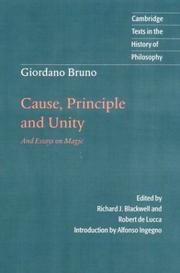
ISBN: 1107114500 0511005571 128042933X 1139164228 0511172184 0511150296 0511323174 0511050186 052159359X 0521596580 Year: 1998 Publisher: Cambridge Cambridge University press
Abstract | Keywords | Export | Availability | Bookmark
 Loading...
Loading...Choose an application
- Reference Manager
- EndNote
- RefWorks (Direct export to RefWorks)
Giordano Bruno's notorious public death in 1600, at the hands of the Inquisition in Rome, marked the transition from Renaissance philosophy to the Scientific Revolution of the seventeenth century. In his philosophical works he addressed such delicate issues as the role of Christ as mediator and the distinction, in human beings, between soul and matter. This volume presents new translations of Cause, Principle and Unity, in which he challenges Aristotelian accounts of causality and spells out the implications of Copernicanism for a new theory of an infinite universe, and of two essays on magic, On Magic and A General Account of Bonding, in which he interprets earlier theories about magical events in the light of the unusual powers of natural phenomena.
Metaphysics --- Magic --- Arts and Humanities --- Philosophy --- Early works to 1800
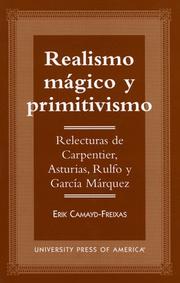
ISBN: 0761811028 9780761811022 Year: 1998 Publisher: Lanham (Md.): University press of America,
Abstract | Keywords | Export | Availability | Bookmark
 Loading...
Loading...Choose an application
- Reference Manager
- EndNote
- RefWorks (Direct export to RefWorks)
Spanish American fiction --- Magic realism (Literature) --- Primitivism in literature.
| Listing 1 - 10 of 42 | << page >> |
Sort by
|

 Search
Search Feedback
Feedback About UniCat
About UniCat  Help
Help News
News